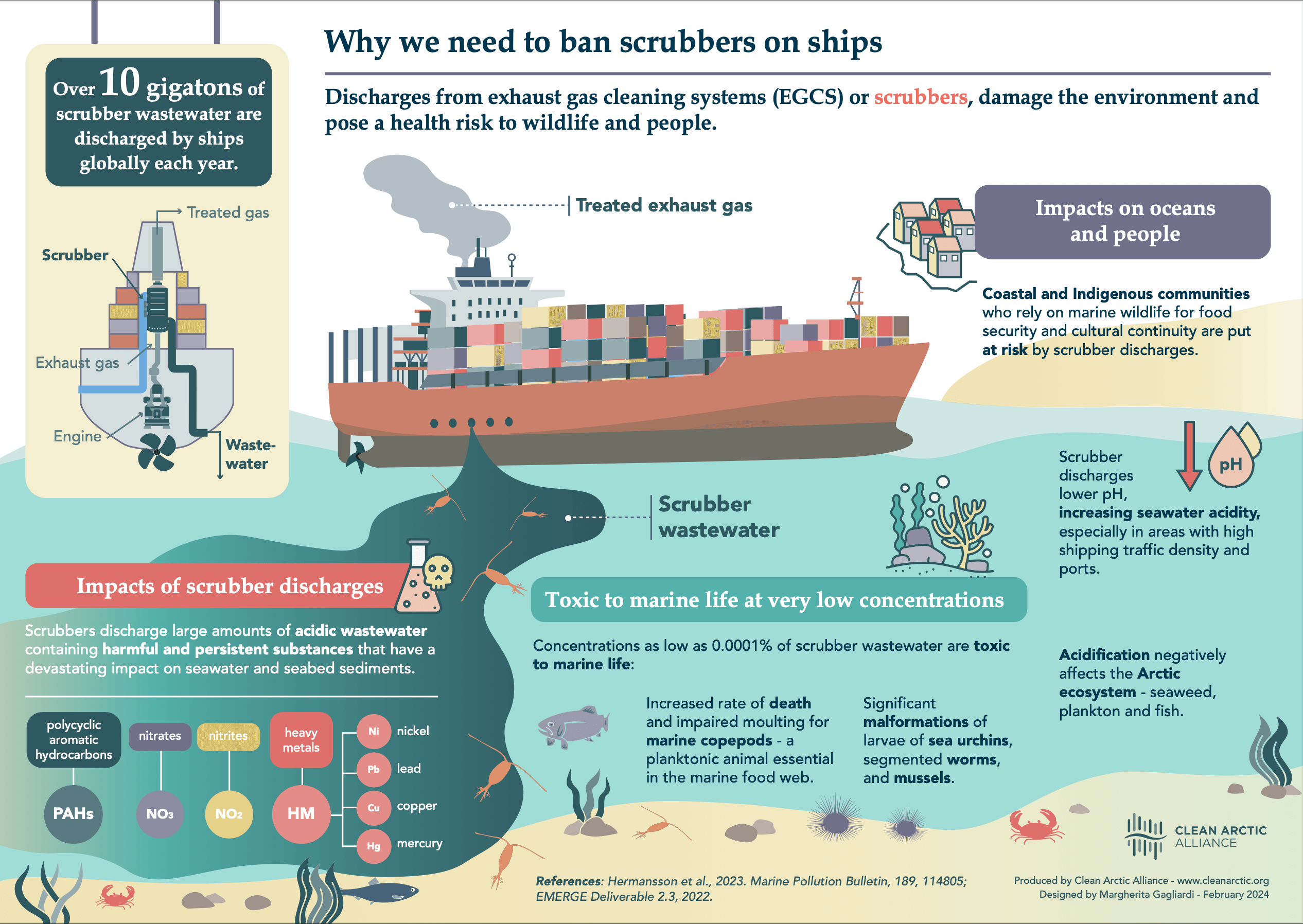
Copenhagen, 15 April, 2024:- The Clean Arctic Alliance today welcomed the Danish government’s announcement that it will prohibit the discharge of scrubber water from ships into the marine environment in its territorial waters (to 12nm), and called for all Arctic states to not only follow Denmark’s action, but to go beyond it by banning the use of scrubbers throughout Arctic waters.
“Denmark’s banning of the discharge of scrubber water from ships is welcome and exciting news and opens the door for Arctic countries to end the use of scrubbers in their waters ”, said Dr Sian Prior, Lead Advisor to the Clean Arctic Alliance. “Scrubbers discharge large amounts of acidic wastewater into the ocean; recent studies have shown that even very low concentrations of scrubber wastewater are toxic to marine life. Arctic governments must not only follow Denmark’s lead but go further – there is an urgent need to ensure that the strongest environmental protection – a ban on the use of scrubbers – is put in place to protect the ocean globally, but especially in Arctic waters, which supports highly productive ecosystems and wildlife, as well as Indigenous communities who rely on the ocean for food security.”
“The call for a scrubber discharge ban brought together Danish green NGOs to ask for a scrubber water discharge ban in Danish seas preventing ships from discharging high amounts of toxic persistent heavy metals and carcinogenic PAHs (polycyclic aromatic hydrocarbons) directly into nature. As a result, both our Environment Minister Magnus Heunicke and the Danish Parliament paid attention and have now banned the discharge of scrubber water to the benefit of marine ecosystems”, said Kåre Press-Kristensen, Senior Advisor, Head of Secretariat at Green Global Futures.
“As a growing number of coastal states take action against pollution by scrubbers, based on the scientific evidence, other countries must follow. The Clean Arctic Alliance calls on Canada, Greenland, Iceland, Norway, Russia and the State of Alaska to take action and ban the use of scrubbers in the Arctic. There is already an IMO resolution calling for ships in the Arctic to voluntarily move to distillate or other cleaner fuels or methods of propulsion which would make the installation and use of scrubbers redundant, and in July 2024 a ban on the use and carriage of heavy fuel oils (HFOs) in Arctic waters will come into effect. Since there is very limited opportunity and capacity for shipping to discharge scrubber waste to reception facilities in ports in the Arctic, a ban on the use of scrubbers is the most sensible approach”, said Eelco Leemans, Technical Advisor to the Clean Arctic Alliance.
About Scrubbers
Since January 2020, the allowable sulphur content on ships’ fuels has decreased from 4.5% to 0.5%. Ships burning high sulphur heavy fuel oils (HFO) can use exhaust gas cleaning systems (EGCS) or scrubbers to remove excess sulphur to comply with the new sulphur standard and allow ships to continue to use of heavy fuel oils, the most polluting type of marine fuel. However, scrubbers turn an air pollution problem into an ocean pollution problem. Read more.
In June 2021 the International Maritime Organization finally adopted a ban on the use and carriage of heavy fuel oil in the Arctic, with the first deadline coming into force in July 2024. The IMO ban however allows ships in the Arctic to continue to carry and burn significant quantities of HFO in the coming years if they have protected fuel tanks, or if they fly the flag of an Arctic coastal state and are issued with a waiver, resulting in ongoing HFO spill risks, continued high emissions of black carbon, and failure to achieve protection of a region that is rapidly changing due to climate warming. Exempt vessels, or those with waivers can continue to use heavy fuel oils by installing scrubbers, thus allowing the continued use of heavy fuel oils, as well as creating an ocean pollution problem.
ENDS
Contact:
Dave Walsh, Communications Advisor, [email protected], +34 691 826 764
Notes:
Broad political agreement: Denmark prohibits the discharge of scrubber water from ships into the marine environment
Together with SF, LA, DD, K, EL, RV and ALT, the government has entered into an agreement on a ban on the discharge of so-called scrubber water into Danish territorial waters
Bred politisk aftale: Danmark forbyder udledning af scrubbervand fra skibe til havmiljøet – Regeringen har sammen med SF, LA, DD, K, EL, RV og ALT indgået en aftale om et forbud mod udledningen af såkaldt scrubbervand i det danske territorialfarvand
See also:
- Blog – Scrubbers: The Solution to Pollution is… Stop Using Dirty Fuel
- Webinar on Scrubbers: The End of an End of Pipe Solution?
- Infographic: Why We Need to Ban Scrubbers on Ships & Why the Use of Scrubbers to Limit Air Pollution is Flawed
About the Clean Arctic Alliance
Made up of 23 not-for-profit organisations, the Clean Arctic Alliance campaigns to persuade governments to take action to protect the Arctic, its wildlife and its people.
Members include: Alaska Wilderness League, Bellona, Clean Air Task Force, Ecology and Development Foundation ECODES, Environmental Investigation Agency, Equal Routes, Eurasian Wildlife and Peoples, Friends of the Earth US, Global Choices, Green Global Future, Green Transition Denmark, Greenpeace, Iceland Nature Conservation Association, International Cryosphere Climate Initiative, Nature And Biodiversity Conservation Union, Ocean Conservancy, Pacific Environment, Seas At Risk, Surfrider Foundation Europe, Stand.Earth, Transport & Environment, WWF and Zero.
More more information visit https://www.cleanarctic.org/

